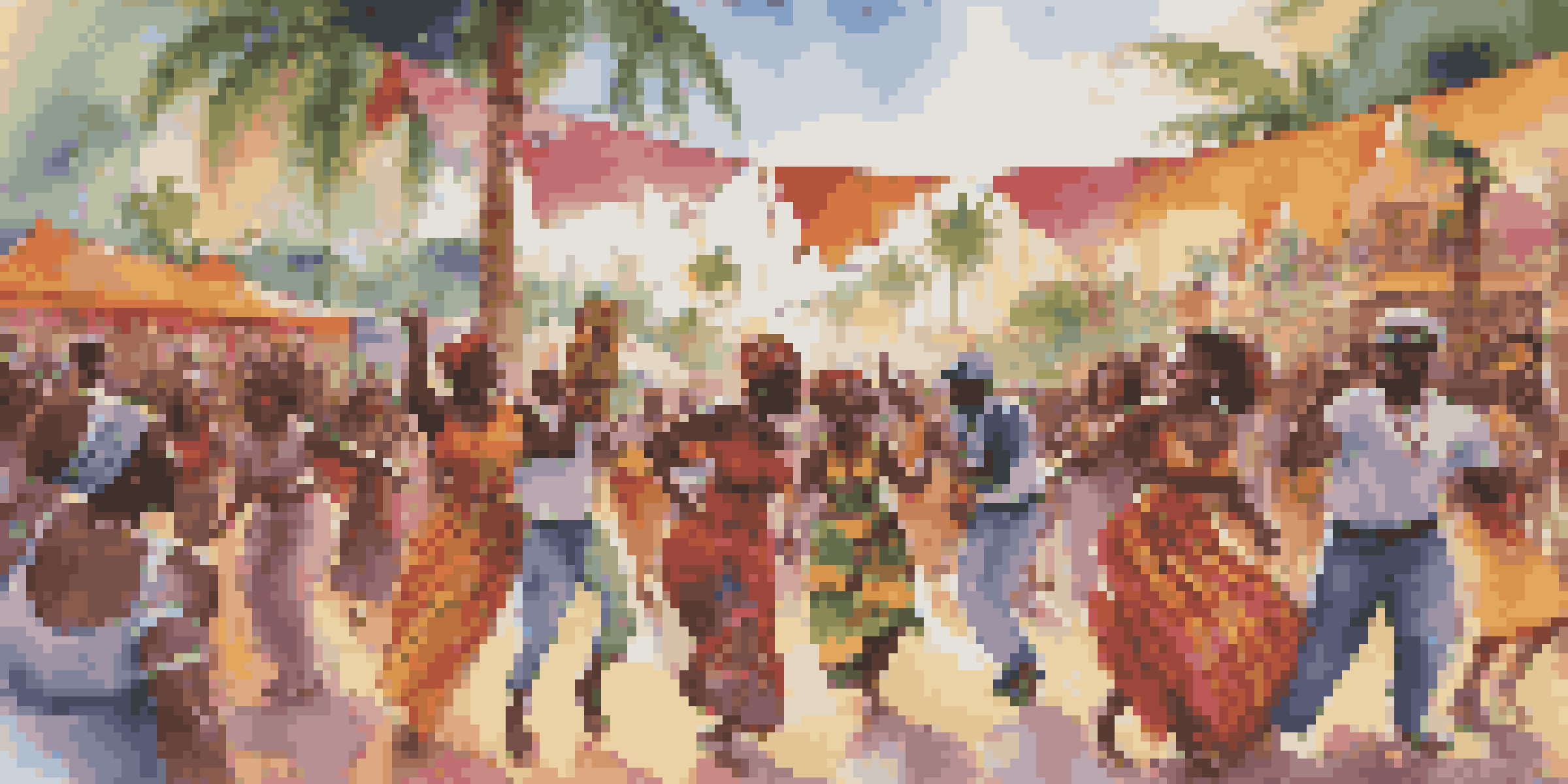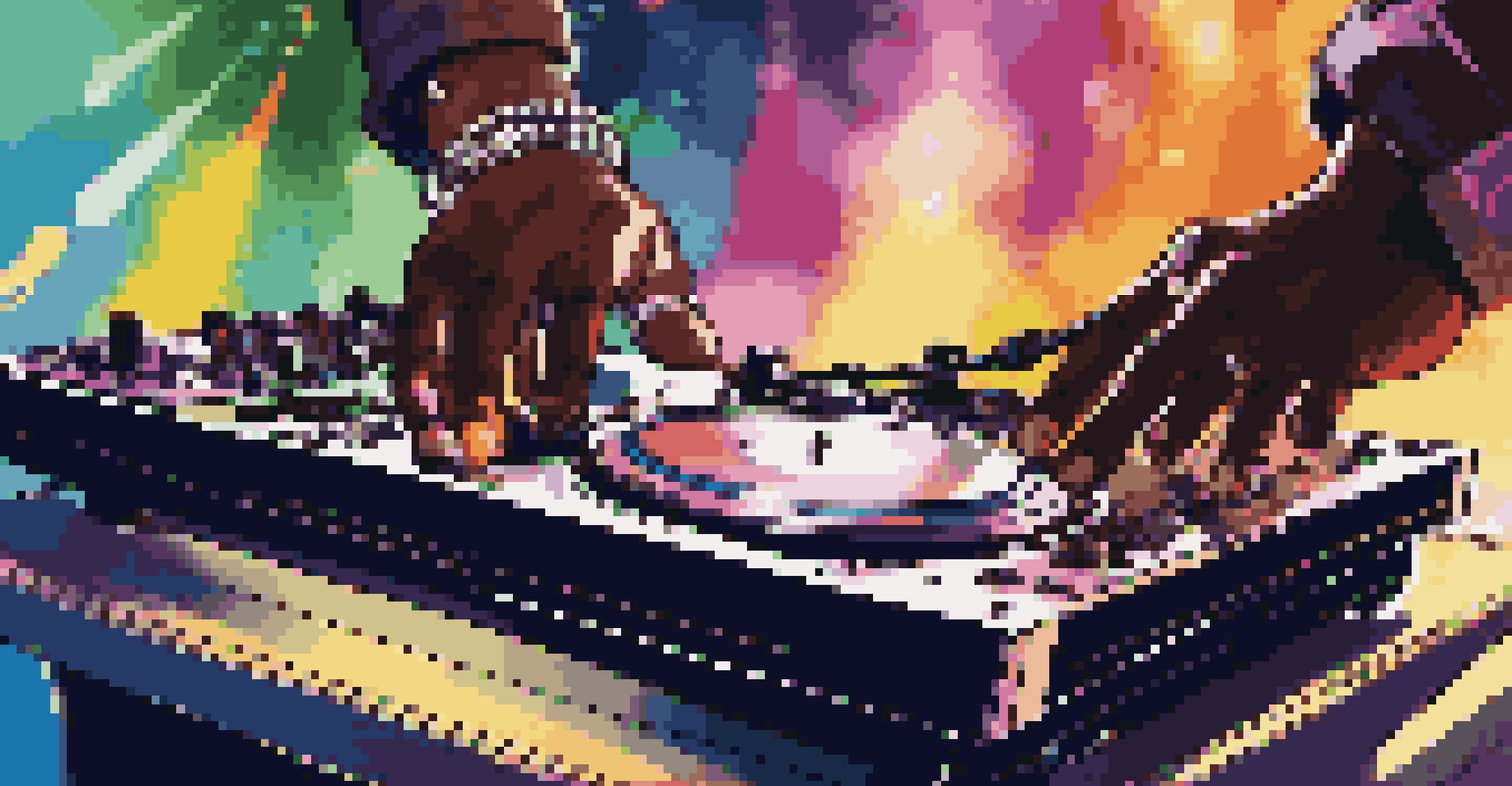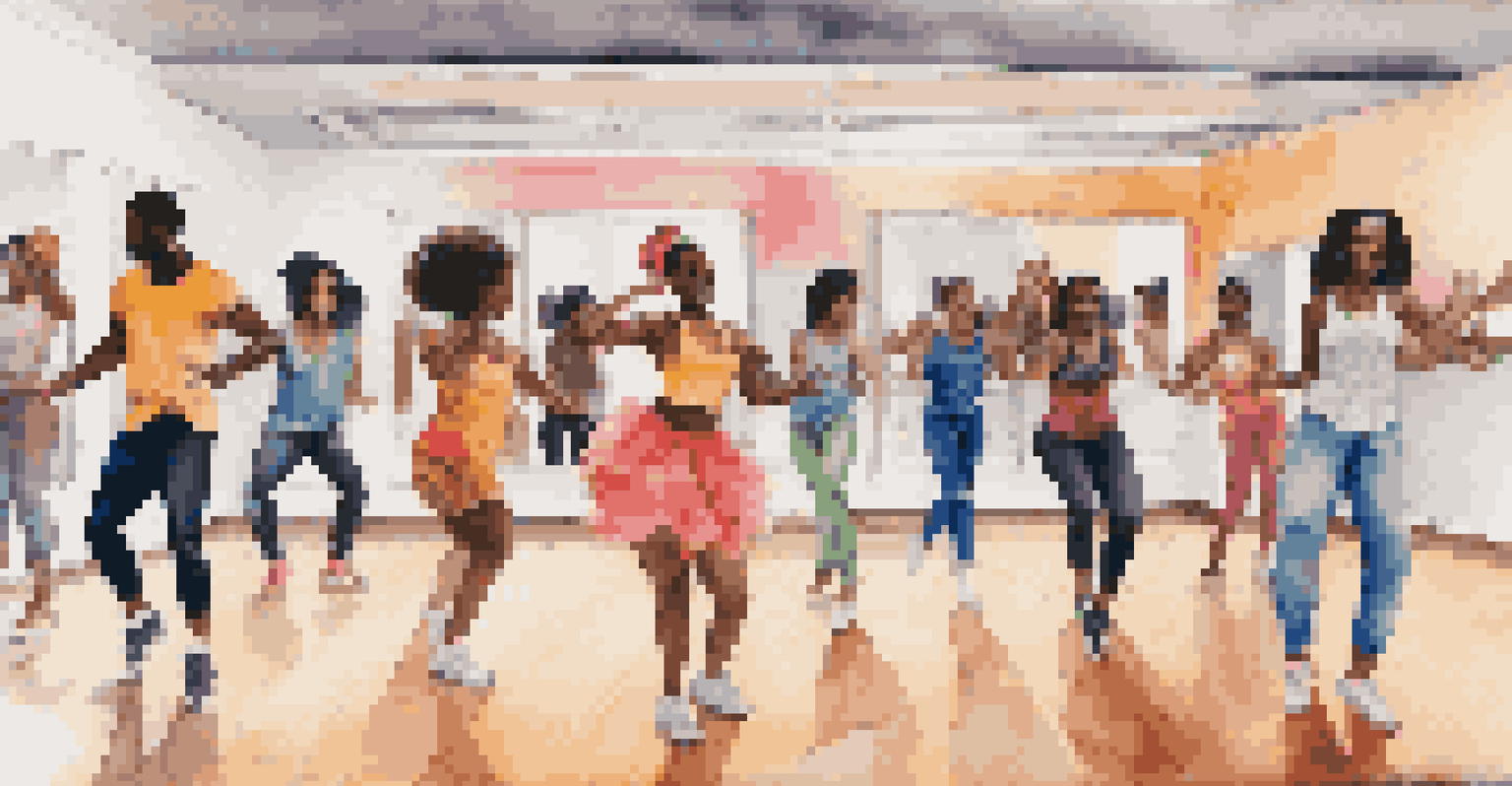Afrobeats: The Global Rise of African Dance Music Styles

Understanding Afrobeats: More Than Just a Genre
Afrobeats is more than just a music genre; it's a vibrant cultural movement that blends traditional African rhythms with contemporary sounds. Originating from West Africa, particularly Nigeria and Ghana, it encompasses various styles, making it a rich tapestry of musical influences. Artists like Burna Boy and Wizkid have pushed this genre onto the global stage, showcasing its infectious beats and catchy melodies.
Afrobeats is a blend of traditional African rhythms and contemporary sounds that resonates across cultures.
What sets Afrobeats apart is its ability to evolve continuously, integrating elements from hip-hop, dancehall, and even electronic music. This adaptability allows it to resonate with a diverse audience, transcending cultural and geographical boundaries. As a result, Afrobeats has become a powerful voice for African culture in a globalized music industry.
Listeners often find themselves captivated by the rhythmic grooves and relatable themes in Afrobeats songs. Whether it's love, celebration, or social issues, the music speaks to many experiences, making it universally appealing. This connection is a driving force behind its rising popularity worldwide.
The Evolution of Afrobeats: A Historical Perspective
The roots of Afrobeats can be traced back to the 1970s with the emergence of Afrobeat, pioneered by Fela Kuti. Fela's fusion of jazz, funk, and traditional African music laid the groundwork for what would evolve into Afrobeats. Over the years, various artists have contributed to its development, each adding their unique flair and style.

Fast forward to the early 2000s, and we see the birth of the modern Afrobeats movement. Artists began experimenting with new sounds, leading to the creation of catchy hooks and danceable beats that appealed to broader audiences. This shift marked a significant turning point, allowing Afrobeats to flourish both locally and internationally.
Afrobeats: A Global Cultural Movement
Afrobeats combines traditional African rhythms with contemporary sounds, evolving into a powerful cultural force that resonates worldwide.
The genre's expansion was further aided by the rise of social media and streaming platforms, which provided artists with a global stage. Tracks that once were local hits suddenly found their way into playlists worldwide, showcasing the infectious nature of Afrobeats and its potential for international success.
Key Artists Shaping the Afrobeats Scene
When discussing Afrobeats, it's impossible not to mention artists like Burna Boy, Wizkid, and Davido. These musicians have become synonymous with the genre, each bringing a unique perspective and style that captivates fans globally. Burna Boy's blend of Afrobeats with reggae and dancehall has garnered him critical acclaim and a Grammy award.
Music is a universal language, and Afrobeats speaks to the heart of people everywhere.
Wizkid, known for his smooth vocals and collaborations with international artists, has played a significant role in bringing Afrobeats to mainstream audiences. His hit 'One Dance' with Drake was a game-changer, showcasing how Afrobeats can dominate global charts. Similarly, Davido's infectious energy and catchy tracks have made him a household name in and out of Africa.
These artists not only entertain but also serve as cultural ambassadors, highlighting the beauty and richness of African music. Their influence has inspired a new generation of musicians, creating a vibrant ecosystem of sounds and styles that continue to elevate Afrobeats on the world stage.
The Role of Music Videos in Afrobeats' Popularity
In the age of social media, music videos have become a crucial tool for promoting Afrobeats. These visually captivating pieces often reflect the culture, fashion, and dance associated with the music, enhancing its appeal. High-energy dance routines and colorful aesthetics draw viewers in, making them eager to experience the music.
Platforms like YouTube and TikTok have played a pivotal role in the genre's growth. Viral dance challenges and engaging content allow fans to participate and share their love for Afrobeats, creating a sense of community. This interaction not only boosts the genre's visibility but also fosters a deeper connection between artists and fans.
Key Artists Driving Afrobeats Forward
Artists like Burna Boy, Wizkid, and Davido are not only popularizing Afrobeats but also infusing it with their unique styles, shaping its global identity.
Moreover, music videos serve as a canvas for storytelling, often depicting relatable narratives that resonate with audiences. This combination of music and visual art amplifies the emotional impact of the songs, making Afrobeats even more memorable and enjoyable.
Afrobeats and the Global Music Industry
Afrobeats has carved out a significant niche within the global music industry, influencing artists and genres far beyond Africa. Major record labels are now investing in Afrobeats artists, recognizing the genre's immense potential for commercial success. Collaborations between Afrobeats musicians and international stars have become increasingly common, further blending musical styles.
Events like the Afrobeats Festival and concerts featuring top Afrobeats artists attract global audiences, showcasing the genre's popularity. These events not only celebrate the music but also create opportunities for cultural exchange, bringing together fans from different backgrounds to enjoy the vibrant sounds of Afrobeats.
As the genre continues to grow, it challenges traditional notions of mainstream music, proving that African music can hold its own on the world stage. This shift is a testament to the power of creativity and collaboration in the music industry, paving the way for future generations of artists.
Cultural Impact of Afrobeats: Beyond Music
Afrobeats has transcended its musical roots to become a cultural phenomenon, influencing fashion, dance, and lifestyle. The genre's vibrant aesthetics are often reflected in the clothing styles of its artists, inspiring fans to embrace bold colors and unique designs. This cultural crossover has led to a renewed interest in African fashion on a global scale.
Dance is another essential aspect of Afrobeats culture. The energetic, rhythmic movements associated with the genre have created popular dance trends that resonate worldwide. Social media has played a significant role in this aspect, allowing fans to share their dance interpretations and connect with others who share their passion.
Social Media Boosts Afrobeats Appeal
Platforms like YouTube and TikTok are instrumental in promoting Afrobeats, creating viral dance challenges that foster community engagement and elevate the genre's visibility.
Furthermore, Afrobeats often addresses social and political issues, providing a platform for artists to voice their concerns. This ability to blend entertainment with meaningful commentary has made Afrobeats more than just music; it serves as a cultural touchstone that reflects the realities of contemporary African life.
The Future of Afrobeats: Trends and Predictions
As Afrobeats continues to gain traction globally, several trends are emerging that could shape its future. One notable trend is the increasing collaboration between Afrobeats artists and musicians from different genres, creating innovative sounds that appeal to broader audiences. This fusion of styles can lead to exciting new sub-genres, ensuring that Afrobeats remains dynamic and evolving.
Moreover, the growth of digital platforms will likely play a crucial role in the genre's expansion. Streaming services and social media will continue to provide avenues for artists to reach new listeners, making it easier for Afrobeats to penetrate markets previously untouched. This accessibility will foster a more extensive appreciation for the music and its culture.

Finally, as more artists emerge and gain recognition, the narrative around Afrobeats will evolve. It will be fascinating to see how this genre continues to influence and be influenced by global music trends, ultimately solidifying its place in the fabric of world music.